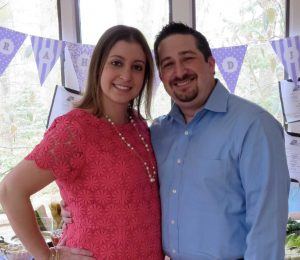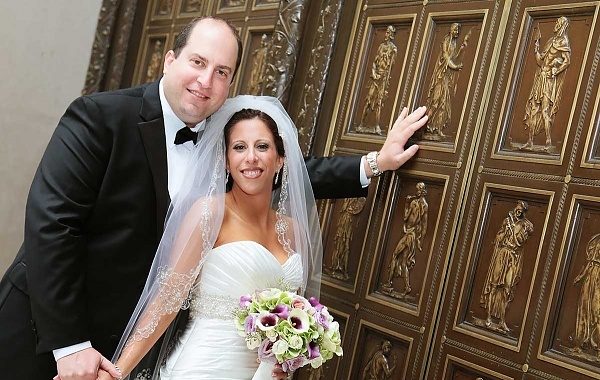Sarah Kaplan joined JDate on a lark while she was in college in 2002. The online dating site geared to Jewish singles was fairly new, and lots of her classmates were joining. She didn’t take it very seriously at the time because while in college, finding dates wasn’t all that difficult.

Sarah Kaplan and Jason Springer connected online
“But I never quite got rid of that profile,” says the now 31-year-old from Somerdale. “I went to law school at Widener and there wasn’t a large Jewish population there, so I started to take it more seriously. I went from Widener to Deptford and then clerked for a judge in Cumberland County. Once you’re in the working world it’s much more challenging to find people with similar backgrounds and interests.”
Three years ago, the site connected Kaplan to Jason Springer. “He looked really familiar and I realized I knew him, that we were Facebook friends who had met several years earlier,” she recalls. “But if he hadn’t looked at my JDate profile, we would have never reconnected.”
But they did, and Jason proposed on New Year’s Eve. The pair will wed in November.
Kaplan is part of a growing trend of 20- and 30-somethings who are looking for love online. The stigma that might have prevented people from dating online in the past is long gone, according to a recent poll conducted by dating sites ChristianMingle.com and JDate.com. They found 85 percent of singles view online dating as socially acceptable.
Twenty-two percent of 25- to 34-year-olds and 17 percent of 35- to 44-year-olds use dating apps and online sites, according to Pew Research. Today, more than 2,000 sites generate $1.5 billion in revenue, says Joe Tracy, publisher of Online Dating Magazine. While most people are familiar with Match.com and eHarmony.com, lots of new niche sites have found creative ways to stand out, including Coffee Meets Bagel, Tinder, Zoosk and Grouper. Some sites are completely free to users, relying on advertisers to earn revenue. Other sites charge subscription fees.
“There’s a huge difference when it comes to people in their 20s and people in their 30s doing online dating,” says Tracy. “People in their 20s tend to use the free online dating services. People in their 30s are starting to think a lot more about serious relationships, and that’s why they put more money and effort into online dating sites like eHarmony.com and Chemistry.com.
“We’ve found that age determines what characteristics are most important when online dating,” Tracy adds. “For example, those in their 20s find looks to be most desirable, while those in their 30s tend to focus more on personality, sense of humor and job security. Common interests tend to be very important for those in their 20s and particularly those in their 30s, which is one reason that there are so many niche online dating services.”
Cherry Hill’s Eric Beckelman, 33, says he tried online dating after too many blind dates went wrong. “My mother set me up, and that was a disaster,” he says. “She and I didn’t like the same girls. I went on one date through JDate and met my future wife. There was that built-in cultural connection.”
It took Beckelman’s wife, Melissa, a bit longer to find him. She tried online dating after relocating to SJ when she was 25. “It wasn’t difficult to get started, but there were periods that were very frustrating in terms of not meeting the right kind of men,” says Melissa, now 29. “I went on maybe 10 or 15 dates before I met Eric.
“I still think my husband got off too easy. He only had to go on one JDate.”
The pair got engaged less than eleven months after their first date and were married a year later. For them, finding a Jewish partner was very important, so JDate was the right site. JDate, founded in 1997, claims more than 750,000 active members worldwide.
All dating sites have their own algorithms to determine how they match people. The site coffeemeetsbagel.com uses a person’s Facebook account to find friends of their friends, and sends a picture of a suggested date with a bit of information about the person each day. If there’s a mutual attraction, the site provides first names and a private phone number where the couple can talk or text, but no personal information is given.
“That phone line expires after seven days, so at that point you should be able to judge for yourself if you feel comfortable sharing your personal information,” says Dawoon Kang, the site’s co-founder.
The site launched in 2012 in New York City and expanded nationally with a mobile app by August 2013. Users skew 60 percent female and 40 percent male, and 90 percent are 35 and under. The site’s top priority, according to Kang, is safety – the largest concern among online daters.
“Matching friends of friends versus total strangers is a huge step in making women feel comfortable,” she says.
Another new site, joingrouper.com, matches groups of friends. A person signs up along with two same-sex friends. The trio is matched with another crew of three people of the opposite sex who have similar interests. The day before the date, the site provides the meeting location (generally a bar), the time and reservation name. A concierge from the site is on-call if necessary. Grouper launched in the summer of 2011 in 10 cities, added 15 more the second year and has recently expanded to London. Its core age group is 21 to 30.
Yet, online dating can have challenges beyond safety issues. “While you can suddenly have a world of options open to you and the ability to meet all sorts of people, you also find yourself judging people based on a few random pictures and the words they wrote,” says Kaplan. “Suddenly, the angle of the shot, the grammatical errors in their writing and the fact that they claim to love TV shows you despise are all in hyper-focus. But if you met the same person in a social setting, you wouldn’t see all of that right away.”
Arielle Schechtman of Spark Networks, which owns more than 20 dating websites, urges users to be honest when setting up their profile. “That’s the best way to set a foundation for a healthy relationship,” she says. “Profile pictures are really important, and I would highly recommend uploading several photos that are clear and recent.”
“More than half of online daters have had at least one bad online dating experience,” says Tracy. “Usually that’s because they feel the person misrepresented himself or herself in their profile.”
“I also encourage women to reach out to men,” adds Schechtman. “The beauty of online dating is that you can control the pace of the relationship and remain relatively anonymous until you’re ready to reveal more information about yourself.”














